Muhammad Ali: His Name Itself Has Power
By Askia Muhammad -Senior Editor- | Last updated: Jun 7, 2016 - 11:42:27 PMWhat's your opinion on this article?
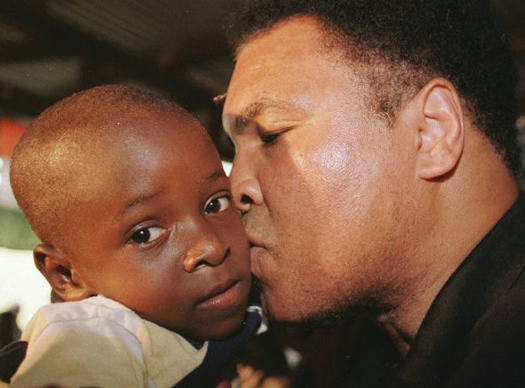
Former Heavyweight boxing champion Muhammad Ali kisses an orphan child at a mission for Liberian refugees in San Pedro, Ivory Coast, August 20, 1997. Ali and his entourage came on a goodwill visit to donate food, wheelchairs, and medicine to the 400 or more orphans after receiving a letter asking for help from the mission’s organizer Sister M. Sponsa Beltran. Photo: AP/Wide World Photo
|
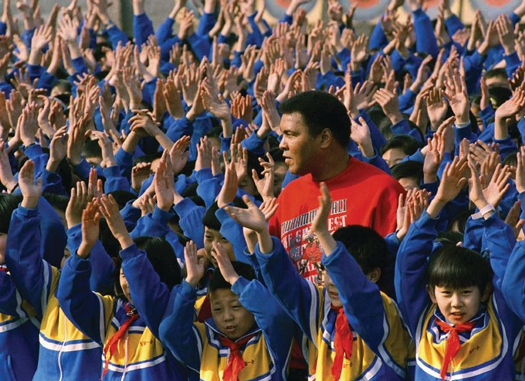
Muhammad Ali is surrounded by hundreds of Chinese school children during a visit to the Beijing No. 1 Experimental Primary School in Beijing, China, Feb. 25, 1993. Ali was in Beijing to promote the first professional boxing event in China since 1949. The four-bout event, on Feb. 27, was billed as “The Brawl at the Wall.” Photo: AP/Wide World Photo
|
He was 18, at the height of his amateur skills when he won the Olympic Heavyweight Boxing Championship. It was in Rome, 1960. But back home in Louisville, Ky., he was soon taught to stay in his racially defined “place.” As his career in professional boxing soared however, so did his interest in “liberation,” “freedom,” from the “oppression” of life in White America, for himself and for all Black people.
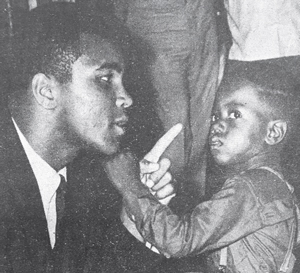
Small Fry Chicago fan, 3-year-old Willie Deberry was on hand to offer his congratulations to World Heavyweight Boxing Champion Muhammad Ali on his titledefense victory over Germany’s Karl Mildenberger in Frankfurt. Wee boy seems to be getting tip from genial champ on how to deliver a left-hand punch.
|
He grew up middle class, clean cut. He was just a year younger than Emmett Till. And like Emmett, he grew up under American apartheid, in the heart of Dixie. And like so many others in his generation who saw vicious dogs, and fire hoses, and mass arrests turned against young Black people, his quest took him coincidentally to Muhammad Mosque of Islam.
In Miami he met Abdul Rahman Muhammad, then known as F.O.I. Captain Sam who was selling Muhammad Speaks newspaper. He was recruited then to Muhammad Mosque where he learned to speak and act in a way no Black athlete had ever acted in United States history—not even “unforgivably Black” heavyweight champion Jack Johnson. Once inside the Nation of Islam, his toughness, and swagger fit right in. He was definitely at home among the men, the F.O.I., the Fruit of Islam.
He was all about quick thinking, fast moving, cleanliness inside and out, right down to the modern time, with an abundant amount of hard hitting thrown in for good measure. He was also intolerant of the abundant supply of injustice dispensed in this country daily.
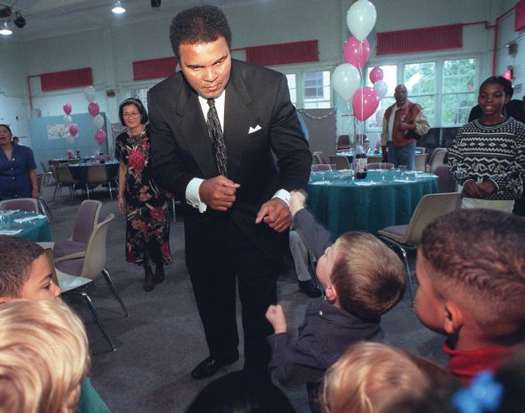
Muhammad Ali, shadow boxes with the children of the Herbert G. Birch Services Pre-School in New York, Oct. 10, 1996, where the former boxing champ went for lunch with the children and their parents. Photo: AP/Wide World Photo
|
Muhammad Ali was like a soundtrack by Curtis Mayfield and Nina Simone, and Black people at the time were ready to get ready with him for the train that was a comin.’ Though he could not sing in tune, he knew the words to one song and invoked those words like an anthem: “A White Man’s Heaven is a Black Man’s Hell,” written by Minister Louis Farrakhan, then known as “Louis X.”
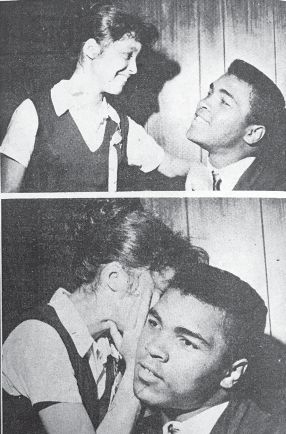
14-year-old Carol Ann Knowles came to Muhammad Speaks’ office to personally congratulate world heavyweight champion Muhammad Ali on his recent Liston victory. Typical of teenagers who admire the famous athlete, Carol (below) whispers into the champion’s ear her advice on how to win his next fight.
|
The very name itself conveyed its own power. Elijah Muhammad gave Cassius Marcellus Clay a name he could live up to in his own life journey. A name to which he could aspire. And he did aspire to it. And oh, how Ali lived up to the brave commander’s name.
When he set an example, resisting the American military industrial complex, Muhammad Ali gave me and literally thousands of other young Black men my age the courage to become Conscientious Objectors from U.S. military service during the Vietnam era.
“Man, I ain’t got no quarrel with them Viet Cong,” Ali said, literally speaking for all of us not yet conscripted into active service in the conflict. “My enemy is you,” he said to Whites who challenged his stand. Then, he was denounced by sportswriters and others, even other Black folks, who famously refused to recognize his Islamic name. The Nation of Islam community, the Black community, stood by our hero.
People the world over and especially Americans may love him now, but he was once the most reviled athlete in America. This ugly, hostile treatment went on for at least five years.
In 1967, one writer likened Ali to “those unwashed punks who picket and demonstrate,” and another demanded that “boxing should throw Clay out on his inflated head.”
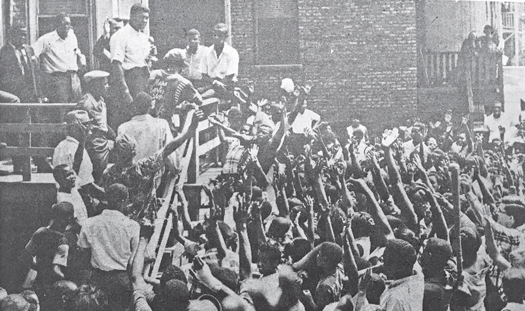
A true hero to millions of children around the world is World Heavyweight Champion Muhammad Ali. Here the young pugilist speaks from a porch to cheering, happily-shouting and waving youngsters in a Chicago West Side slum community.
|
But by then Ali had already begun his ascent, beyond their reach. He told Howard University students in that same year, shortly before he refused to be inducted into the U.S. military that he already had 28 invitations from leaders of Muslim countries across the globe.
“I am the brother of more than 600 million followers of Allah. You are living in the last days of hell in this country,” Ali told the Howard students according to an account in the prize-winning TV documentary “Eyes on the Prize.”
Even as he soared, he had to fight for his dignity. “What’s my name?” the Black Muslim would demand, until all his detractors surrendered to the power of his name—Muhammad Ali.
This all took place during tense times in the United States. Black Muslims, Black Power, Black hairstyles, Black fashion, Black culture, Black, black, black, black black. All of that rushing to the foreground in this country and in the world. Muhammad Ali never blinked once.
There was discontent everywhere when Muhammad Ali faced his greatest tests. This country was fighting a war in Asia and opposition to the war and to draft which supplied the war’s human cannon fodder was spreading like wildfire. Muhammad Ali became the plain spoken, consensus spokesman for that opposition among all Americans.
By the way, the opposition to war is fundamental to Mr. Muhammad’s teaching. It’s part of “What The Muslims Want. What The Muslims Believe.” Point No. 10: “We believe that we who declare ourselves to be righteous Muslims, should not participate in wars which take the lives of humans.” Our champion Muhammad Ali stood up on belief in that principle, and Allah blessed him to be the winner.
During World War II, Mr. Muhammad and dozens of his followers had been imprisoned for refusing to fight against Japan. Like those who had gone on before him in the N.O.I., Ali declared he would suffer any punishment rather than betray the principles of his religion. It’s not exaggeration to say that Muhammad Ali was not alone when it came to integrity in the Nation of Islam. In those days there were surely thousands of men all over the country in mosques and temples who also had that same courage, that same dedication to the upliftment of Black people, that same integrity, that same opposition to war.
As long as the Honorable Elijah Muhammad was still present among us, leading the Nation, Muhammad Ali was a loyal helper, even heading a month-long delegation of Muslim dignitaries including Mr. Muhammad’s younger brother Jam Muhammad, Minister Louis Farrakhan, even boxing promoter Don King and heavyweight contender Larry Holmes, in November 1974 as guests of Jamaican President Michael Manley.
The trip was the subject of frontpage feature treatment in Muhammad Speaks newspaper.
The banner headline covered a panoramic-like photograph: “Islam in Jamaica” the headline read.
When Ali first stood he was a young man. He had a great deal to lose, yet he risked it all. In the end, our champion was made to prevail, and we all—the F.O.I., the followers of the Honorable Elijah Muhammad, the Black community, indeed the entire American community—prevailed with him. We love our hero madly. He was our Champion who knew when not to fight.
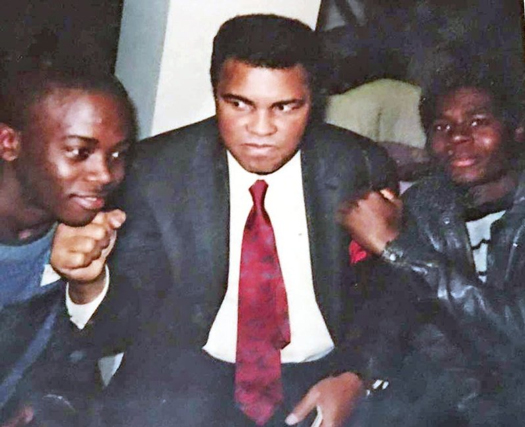
Muhammad Ali with young men in St Louis. Photo: Courtesy of Anthony Shahid
|
(Askia Muhammad is a past editor of the Muhammad Speaks newspaper and The Final Call newspaper.)
INSIDE STORIES AND REVIEWS
-
-
About Harriett ... and the Negro Hollywood Road Show
By Rabiah Muhammad, Guest Columnist » Full Story -
Skepticism greets Jay-Z, NFL talk of inspiring change
By Bryan 18X Crawford and Richard B. Muhammad The Final Call Newspaper @TheFinalCall » Full Story -
The painful problem of Black girls and suicide
By Charlene Muhammad -National Correspondent- » Full Story -
Exploitation of Innocence - Report: Perceptions, policies hurting Black girls
By Charlene Muhammad -National Correspondent- » Full Story -
Big Ballin: Big ideas fuel a father’s Big Baller Brand and brash business sense
By Bryan Crawford -Contributing Writer- » Full Story






 Click Here Stay Connected!
Click Here Stay Connected!








